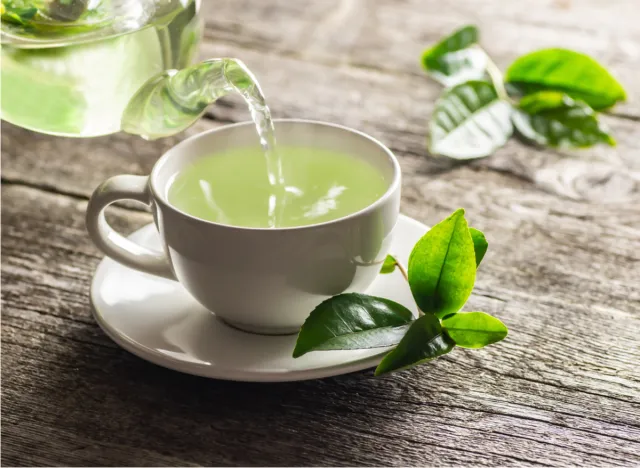4 Best Drinking Habits for Dementia, Say Dietitians

Dementia is not only an extremely difficult disease to deal with, but it’s a very common one as well. In fact, the CDC estimates that around 5.8 million Americans get dementia every year, and they predict that those numbers will grow to around 13.9 million by the year 2060.
While there are many factors that affect your risk for developing dementia, such as genetics, age, environment, and exercise, your daily diet plays a significant role as well. For example, eating plenty of fiber, getting the right nutrients, and limiting your consumption of added sugar can all help to lower your risk of dementia.
When it comes to the drinks you consume, what are some healthier drinking habits you can adopt to reduce your dementia risk? We talked with Janet Coleman, RD with The Consumer Mag to find out.
And for more healthy aging tips, check out The #1 Fish to Keep Your Brain Sharp.
Drink a cup of coffee every day.

Moderate amounts of coffee have been shown to have positive effects on your brain health, which is great news for coffee lovers everywhere!
“Coffee is rich in antioxidants and has been found to protect against dementia. It also contains an amino acid called L-theanine that can improve brain function, mood, and attention span. A study published in the Journal of Alzheimer’s Disease found that drinking coffee may reduce the risk of developing dementia by up to 54%,” says Coleman.
Drink tea.

Tea is another beverage that has been found to have many positive health benefits, including those related to your brain and cognitive functioning.
“Studies have shown that drinking tea can help prevent cognitive decline. For example, one study published in the American Journal of Preventive Medicine found that women who drank three cups of black or green tea per day had a lower risk of developing cognitive impairment than those who didn’t drink tea at all,” says Coleman.
Drink alcohol moderately.

There is some debate over the consumption of alcohol. But where most researchers have landed is that in moderation, alcohol is okay. It’s excessive drinking that may lead to many different health complications.
“Alcohol consumption has been linked with lower levels of depression, anxiety, and suicide attempts among seniors than those who don’t drink at all or those who drink heavily. However, excessive alcohol consumption has also been linked to various health problems including dementia and other forms of cognitive impairment like Alzheimer’s disease, as well as an increased risk for falls and injuries among older adults living independently in their homes,” says Coleman.
Limit sugar-sweetened beverages.

Regular consumption of sugar-sweetened beverages like soda and sugary fruit drinks have been found to lead to many different health complications, including diabetes, heart disease, and even Alzheimer’s and dementia.
According to a study published in Stroke, increased consumption of artificially-sweetened soft drinks was linked to an increase in the risk of stroke and dementia.








